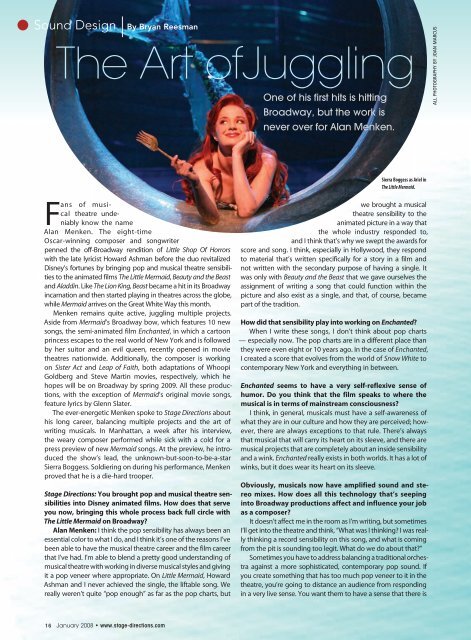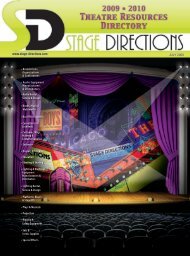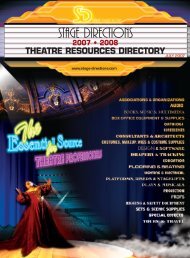Download a PDF - Stage Directions Magazine
Download a PDF - Stage Directions Magazine
Download a PDF - Stage Directions Magazine
Create successful ePaper yourself
Turn your PDF publications into a flip-book with our unique Google optimized e-Paper software.
Sound Design<br />
By Bryan Reesman<br />
The Art ofJuggling<br />
One of his first hits is hitting<br />
Broadway, but the work is<br />
never over for Alan Menken.<br />
All photography by Joan Marcus<br />
Fans of musical<br />
theatre undeniably<br />
know the name<br />
Alan Menken. The eight-time<br />
Oscar-winning composer and songwriter<br />
penned the off-Broadway rendition of Little Shop Of Horrors<br />
with the late lyricist Howard Ashman before the duo revitalized<br />
Disney’s fortunes by bringing pop and musical theatre sensibilities<br />
to the animated films The Little Mermaid, Beauty and the Beast<br />
and Aladdin. Like The Lion King, Beast became a hit in its Broadway<br />
incarnation and then started playing in theatres across the globe,<br />
while Mermaid arrives on the Great White Way this month.<br />
Menken remains quite active, juggling multiple projects.<br />
Aside from Mermaid’s Broadway bow, which features 10 new<br />
songs, the semi-animated film Enchanted, in which a cartoon<br />
princess escapes to the real world of New York and is followed<br />
by her suitor and an evil queen, recently opened in movie<br />
theatres nationwide. Additionally, the composer is working<br />
on Sister Act and Leap of Faith, both adaptations of Whoopi<br />
Goldberg and Steve Martin movies, respectively, which he<br />
hopes will be on Broadway by spring 2009. All these productions,<br />
with the exception of Mermaid’s original movie songs,<br />
feature lyrics by Glenn Slater.<br />
The ever-energetic Menken spoke to <strong>Stage</strong> <strong>Directions</strong> about<br />
his long career, balancing multiple projects and the art of<br />
writing musicals. In Manhattan, a week after his interview,<br />
the weary composer performed while sick with a cold for a<br />
press preview of new Mermaid songs. At the preview, he introduced<br />
the show’s lead, the unknown-but-soon-to-be-a-star<br />
Sierra Boggess. Soldiering on during his performance, Menken<br />
proved that he is a die-hard trooper.<br />
<strong>Stage</strong> <strong>Directions</strong>: You brought pop and musical theatre sensibilities<br />
into Disney animated films. How does that serve<br />
you now, bringing this whole process back full circle with<br />
The Little Mermaid on Broadway?<br />
Alan Menken: I think the pop sensibility has always been an<br />
essential color to what I do, and I think it’s one of the reasons I’ve<br />
been able to have the musical theatre career and the film career<br />
that I’ve had. I’m able to blend a pretty good understanding of<br />
musical theatre with working in diverse musical styles and giving<br />
it a pop veneer where appropriate. On Little Mermaid, Howard<br />
Ashman and I never achieved the single, the liftable song. We<br />
really weren’t quite “pop enough” as far as the pop charts, but<br />
Sierra Boggess as Ariel in<br />
The Little Mermaid.<br />
we brought a musical<br />
theatre sensibility to the<br />
animated picture in a way that<br />
the whole industry responded to,<br />
and I think that’s why we swept the awards for<br />
score and song. I think, especially in Hollywood, they respond<br />
to material that’s written specifically for a story in a film and<br />
not written with the secondary purpose of having a single. It<br />
was only with Beauty and the Beast that we gave ourselves the<br />
assignment of writing a song that could function within the<br />
picture and also exist as a single, and that, of course, became<br />
part of the tradition.<br />
How did that sensibility play into working on Enchanted?<br />
When I write these songs, I don’t think about pop charts<br />
— especially now. The pop charts are in a different place than<br />
they were even eight or 10 years ago. In the case of Enchanted,<br />
I created a score that evolves from the world of Snow White to<br />
contemporary New York and everything in between.<br />
Enchanted seems to have a very self-reflexive sense of<br />
humor. Do you think that the film speaks to where the<br />
musical is in terms of mainstream consciousness?<br />
I think, in general, musicals must have a self-awareness of<br />
what they are in our culture and how they are perceived; however,<br />
there are always exceptions to that rule. There’s always<br />
that musical that will carry its heart on its sleeve, and there are<br />
musical projects that are completely about an inside sensibility<br />
and a wink. Enchanted really exists in both worlds. It has a lot of<br />
winks, but it does wear its heart on its sleeve.<br />
Obviously, musicals now have amplified sound and stereo<br />
mixes. How does all this technology that’s seeping<br />
into Broadway productions affect and influence your job<br />
as a composer?<br />
It doesn’t affect me in the room as I’m writing, but sometimes<br />
I’ll get into the theatre and think, “What was I thinking? I was really<br />
thinking a record sensibility on this song, and what is coming<br />
from the pit is sounding too legit. What do we do about that?”<br />
Sometimes you have to address balancing a traditional orchestra<br />
against a more sophisticated, contemporary pop sound. If<br />
you create something that has too much pop veneer to it in the<br />
theatre, you’re going to distance an audience from responding<br />
in a very live sense. You want them to have a sense that there is<br />
16 January 2008 • www.stage-directions.com

















